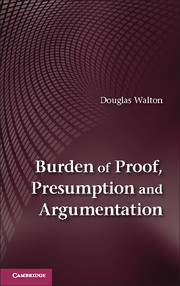Book contents
- Frontmatter
- Dedication
- Contents
- Acknowledgments
- 1 Introduction to Basic Concepts and Methods
- 2 Burdens of Proof in Legal Reasoning
- 3 Presumption in Legal Reasoning
- 4 Shifting the Burden of Proof in Witness Testimony
- 5 Burden of Proof in Dialogue Systems
- 6 Solving the Problems of Burden of Proof
- 7 Burdens of Proof in Different Types of Dialogue
- 8 Conclusions
- Bibliography
- Index
7 - Burdens of Proof in Different Types of Dialogue
Published online by Cambridge University Press: 05 July 2014
- Frontmatter
- Dedication
- Contents
- Acknowledgments
- 1 Introduction to Basic Concepts and Methods
- 2 Burdens of Proof in Legal Reasoning
- 3 Presumption in Legal Reasoning
- 4 Shifting the Burden of Proof in Witness Testimony
- 5 Burden of Proof in Dialogue Systems
- 6 Solving the Problems of Burden of Proof
- 7 Burdens of Proof in Different Types of Dialogue
- 8 Conclusions
- Bibliography
- Index
Summary
Most of the literature on burden of proof in argumentation studies and AI has concentrated so far on the persuasion type of dialogue. This concentration is natural enough, because the bulk of this literature has concentrated on burden of proof in legal argumentation. The most significant exception is deliberation dialogue, where some recent work has begun to tentatively investigate burden of proof in that setting. The problem now posed is whether burden of proof operates in deliberation dialogue in the same way that it operates in persuasion dialogue, or whether there are essential differences in this regard between the two types of dialogue.
This chapter analyzes four examples of deliberation dialogue where burden of proof poses a problem. Based on analysis of the argumentation in these examples, a working hypothesis is put forward. It is that burden of proof only becomes relevant when deliberation dialogue shifts, at the beginning of the argumentation stage, to a persuasion dialogue. The hypothesis is that the shift can be classified as embedding one type of dialogue into another, meaning that the goal of the first type of dialogue continues to be supported once the transition to the second type of dialogue has been made (Walton and Krabbe, 1995, 102). In other instances, it is well known that a shift can be illicit, where the advent of the second dialogue interferes with the fulfillment of the goal of the first one. It has also been shown that such shifts can be associated with fallacies, as well as other logical and communicative problems (Walton, 2007, chapter 6).
Information
- Type
- Chapter
- Information
- Burden of Proof, Presumption and Argumentation , pp. 211 - 244Publisher: Cambridge University PressPrint publication year: 2014
